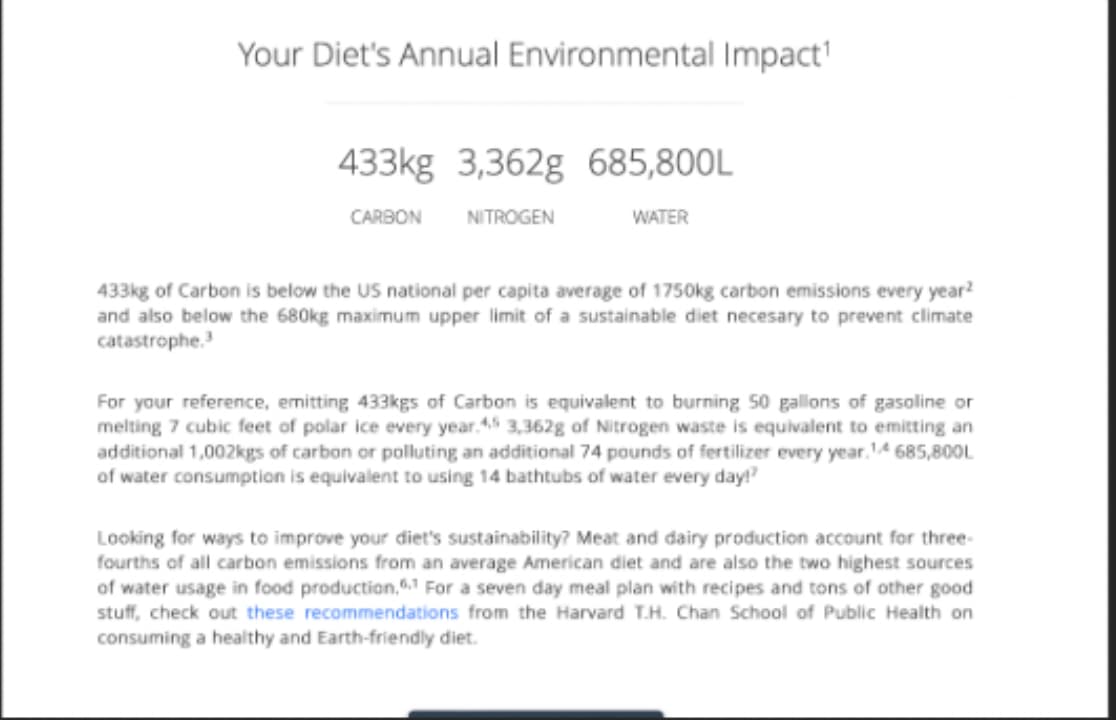Dear Dilip,
It’s great to see you, Nithin and your team take so much interest in this subject.
Going step by step -
Tools to measure the outcome:
-
From a health perspective: Monitoring various health parameters, such as cholesterol levels, blood pressure, body weight, and other, at the current value and regularly after incorporating more plant based foods in your diet can help evaluate the health benefits of a plant-based diet.
-
From an environmental perspective: As per a study, a global switch to diets that rely less on meat could save up to 8 million lives by 2050, reduce greenhouse gas emissions by two thirds, and lead to healthcare-related savings and avoid climate damages of $1.5 trillion (US)
As you already might be aware, there are various ways to calculate your “Foodprint”. One my colleagues recorded theirs on the below link: https://harvard-foodprint-calculator.github.io
There are various other online tools as well. Reading reports mentioning the impact of a dietary shift helps as well. Attaching the link of 5 reports published by PBFIA in collaboration with various organisations: Insights – PBFIA
-
From an economic perspective: Keeping track of your expenses in a plant based diet can help draw a parallel. In India especially, considering the vast amounts of options that are by default devoid of meat and dairy or with minor tweaks, coupled with the companies’ efforts to create innovative and tasty alternatives. Also, you might still find the alternatives priced slightly higher than their counterparts, but work is consistently done to bring the cost down even further.
-
From an animal welfare perspective: As per these figures of 2016 (with consumption increased considerably over the years now) An estimated 50 billion chickens are slaughtered for food every year (excluding male chicks and unproductive hens killed in egg production). Nearly 1.5 billion pigs are killed to feed the growing appetite for pork, bacon, ham and sausages – a number that has tripled in the last 50 years. When it comes to seafood, the number of individual fish and shellfish is almost impossible to calculate. One hundred and fifty million tonnes of seafood were produced for human consumption in 2016.
Regarding your decision to switch to a plant-based diet and its effects, making informed and guided choices in this regard can bring about some truly positive changes for your overall health and well-being.
Historically, plant-based foods have played a significant role in various diets, such as the Mediterranean diet and Ayurveda, emphasizing the consumption of whole grains, fruits, and vegetables. Unfortunately, with our modern sedentary lifestyle, erratic eating habits, and increased stress levels, our diets have shifted away from this balanced approach, leading to metabolic imbalances, inflammation, and disrupted gut health.
Animal-based foods do make an impact on metabolic outcomes. For an instance milk provides growth factors, IGF-1 etc, that are proven in my many research papers to be associated with metabolic disorders.
By transitioning to a plant-based diet many benefits can be restored but as you rightly said, the selection of food is the key. For instance, if one substitutes their foods with simple carbs rather than balancing, the effects will be negative and do more harm than good. Balancing and exchanging food groups is what needs to be learned while making a transition.
Also, every human body is different, so initial effects will vary, but you can experience several benefits that are worth noting:
- Improved emotional well-being: Many people who transition from a heavy meat-based diet to a plant-based diet have reported some positive changes in their behavior and anger levels. Plant-based diets have been associated with a positive impact on mood and mental health.
- Increased energy levels: Plant-based foods, such as soybean, almonds, and chia seeds, are excellent sources of protein and essential fatty acids like Omega-3, isoflavones and more. These nutrients work as antioxidants and can contribute to improved energy levels and enhanced oxygen uptake in the body.
- Reduced bloating, acidity and inflammation: Plant-based diets are typically rich in fiber, which aids digestive health and can lead to a reduction in bloating and body swelling. Also, fruits and vegetables, soybeans, tofu, and some nuts, seeds, and legumes are alkaline food.
- Improved cholesterol levels: Following a plant-based diet for as little as 21 days has been shown to significantly lower cholesterol levels.Studies have found that plant-based diets lower cholesterol levels more effectively than other diets. In 2017, researchers in a study reviewed 49 studies that compared plant-based diets with omnivorous diets to test their effects on cholesterol. Plant-based diets lowered total cholesterol, LDL, and HDL levels when compared to omnivorous diets.
Generally, it is advisable to have a full body check once in 6 months but make sure that you take C-reactive protein test as well because that indicates body inflammation. Also staying cautious of deficiencies such as Vitamin B12 deficiency (which might occur to some extent even with non-vegetarians) is a good practice.
Everyone also needs to be aware and mindful of their underlining diseases or deficiencies because the transition is also dependent upon the health status.
A documentary I do recommend to everyone to see some incredible athletes living on a plant based diet for a better perspective is “The Game Changers” executive produced by James Cameron, Arnold Schwarzenegger, Jackie Chan, Lewis Hamilton, Novak Djokovic, and Chris Paul, on Netlix.
I will be happy to have more conversations with you on this with the PBFIA members continuously working on innovating to produce healthier and tastier plant based alternatives.
With warm regards,
Sanjay Sethi
Executive Director
Plant Based Foods Industry Association
Cell: +91 90047 77119
